This post may contain affiliate links. Please read our disclosure policy.
If you’re interested in learning how to make ashta, but heard that it was difficult, I’ve got the best “shortcut” method for making this sweetened milk-based dessert that is just as good as the original. It combines the clotted cream-making process with ashta cream for a delicious, creamy treat.
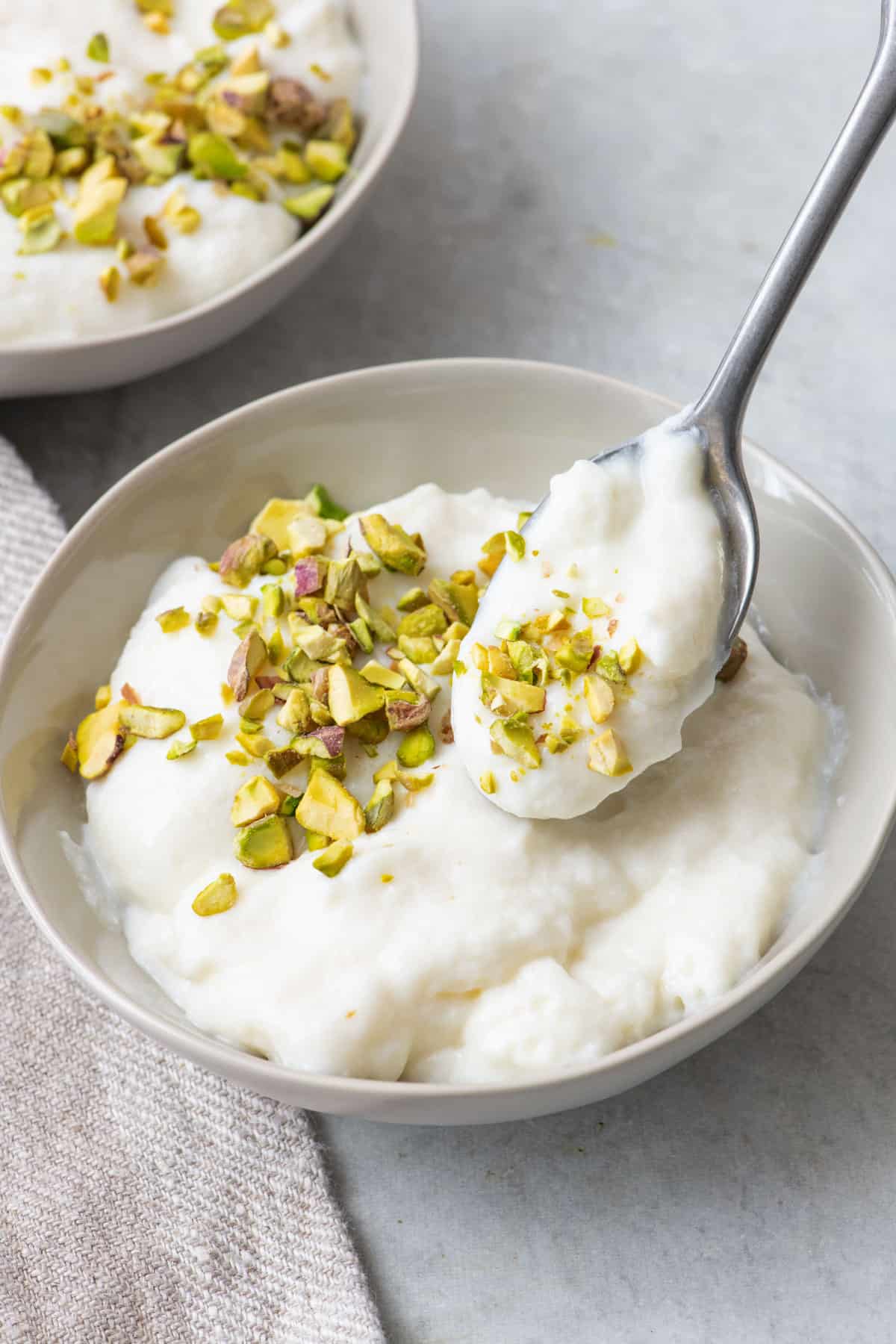
Table of Contents
- What is Ashta?
- Why You Should Learn How to Make Ashta Cream
- Ingredients to Make Ashta
- How to Make Lebanese Ashta
- Tips for Making Ashta
- Popular Substitutions & Additions
- Recipes to Make with Homemade Ashta Cream
- How to Store Ashta Cream
- Frequently Asked Questions
- More Cooking Tutorials:
- How to Make Ashta Recipe
It’s important to note that this recipe for making ashta is not the authentic way that Middle Eastern bakeries make it for pastries which involves boiling milk over and over again. This will form a skin over the top that you will skim off and make clotted cream that is then mixed with sugar and rose water. That process takes many hours, but this recipe for ashta is only about 20 minutes of active time.
What is Ashta?
Ashta is popular in the Middle East and is common as a topping for desserts like fruit cocktails and as a filling in sweets, such as Atayef. Think of it like the Middle Eastern version of whipped cream but with the texture of mascarpone cheese.
Why You Should Learn How to Make Ashta Cream
- Perfect for Middle Eastern desserts. That’s one of the best aspects of this smooth clotted cream recipe. You can enjoy it alone with crushed pistachios or use it as the start of another dessert. Some of my favorites for topping with this cream are Layali Lubnan (semolina pudding) and Namoura (semolina cake) and as a substitute for the ricotta in Lebanese kanafa.
- Lasts up to 2 weeks in the fridge. The time and effort to make your homemade ashta cream shouldn’t be wasted! It has a decent shelf life when stored in the refrigerator, so you can add it to your desserts or enjoy it whenever you like.
- Made with just 6 ingredients! The only ingredient you’ll need to search for is the orange blossom water; otherwise, this recipe uses common ingredients in your pantry and a bunch of milk. Ashta is also an excellent way to use milk nearing its expiration date!
Ingredients to Make Ashta
- Milk: For the creamiest consistency, whole milk works best. You could also try making ashta with 2% milk. You’ll use 7 cups of milk for making the clotted cream and ashta.
- Vinegar: Vinegar helps form a skin on the milk, creating curds that are removed and used to make ashta, giving it its creamy texture, similar to cheese or yogurt.
- Flour + cornstarch: These two ingredients thicken the recipe into a smooth and creamy consistency.
- Sugar: Cane sugar is less processed than white sugar, making it the preferred choice for this recipe. Use whatever sugar you prefer.
- Orange blossom water: A typical Middle Eastern and Mediterranean ingredient that adds a distinct floral aroma and flavor.
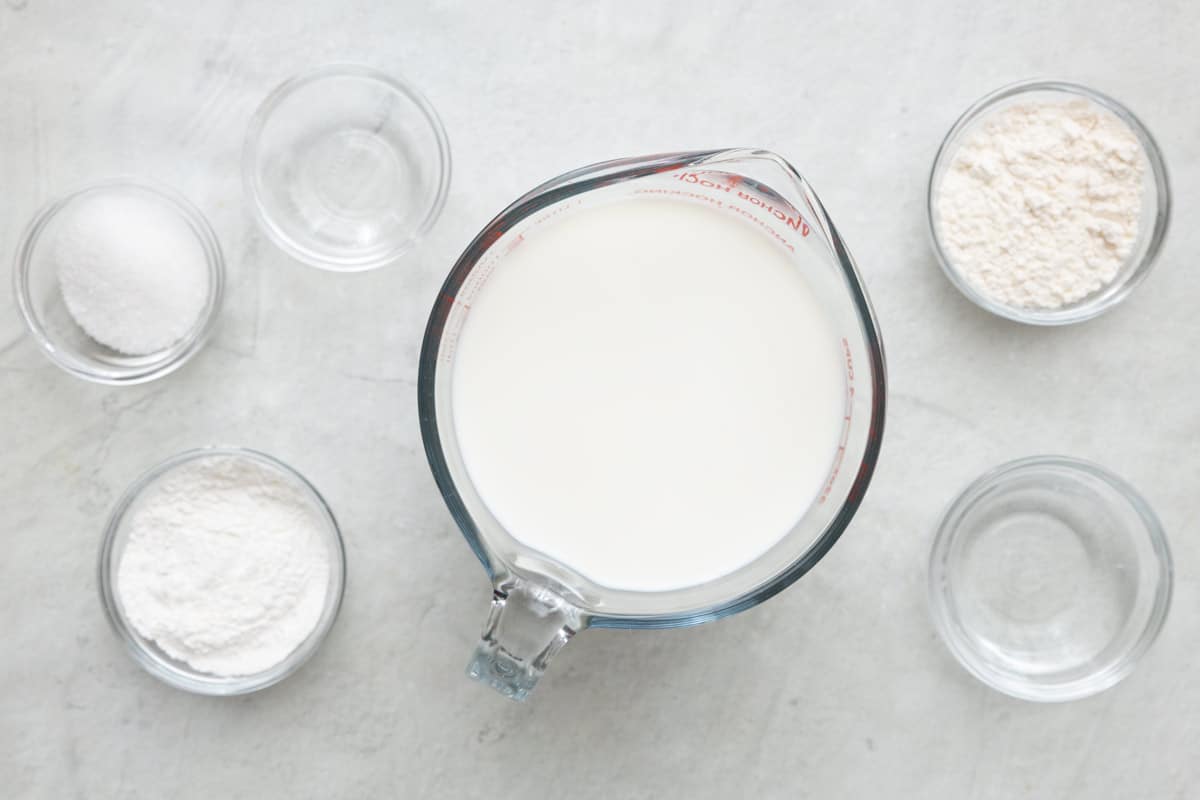
How to Make Lebanese Ashta
While the setting process takes hours, the hands-on part of this recipe is much less and only requires a few steps of making the curds and the cream and then blending them into a luscious ashta cream.
For the Milk Curds
- Bring the milk to a rolling boil and allow it to boil. Be careful not to scorch it.
- Add the vinegar and frequently stir until the mixture starts to boil again. Remove from heat but keep going until the mixture separates.
- Use a slotted spoon to remove the clotted cream from the surface of the saucepan and transfer it to a strainer set over a bowl to catch the whey. Continue the process until only a yellow liquid remains in the saucepan.
- Allow the clotted cream to come to room temperature while you prepare the Ashta cream.
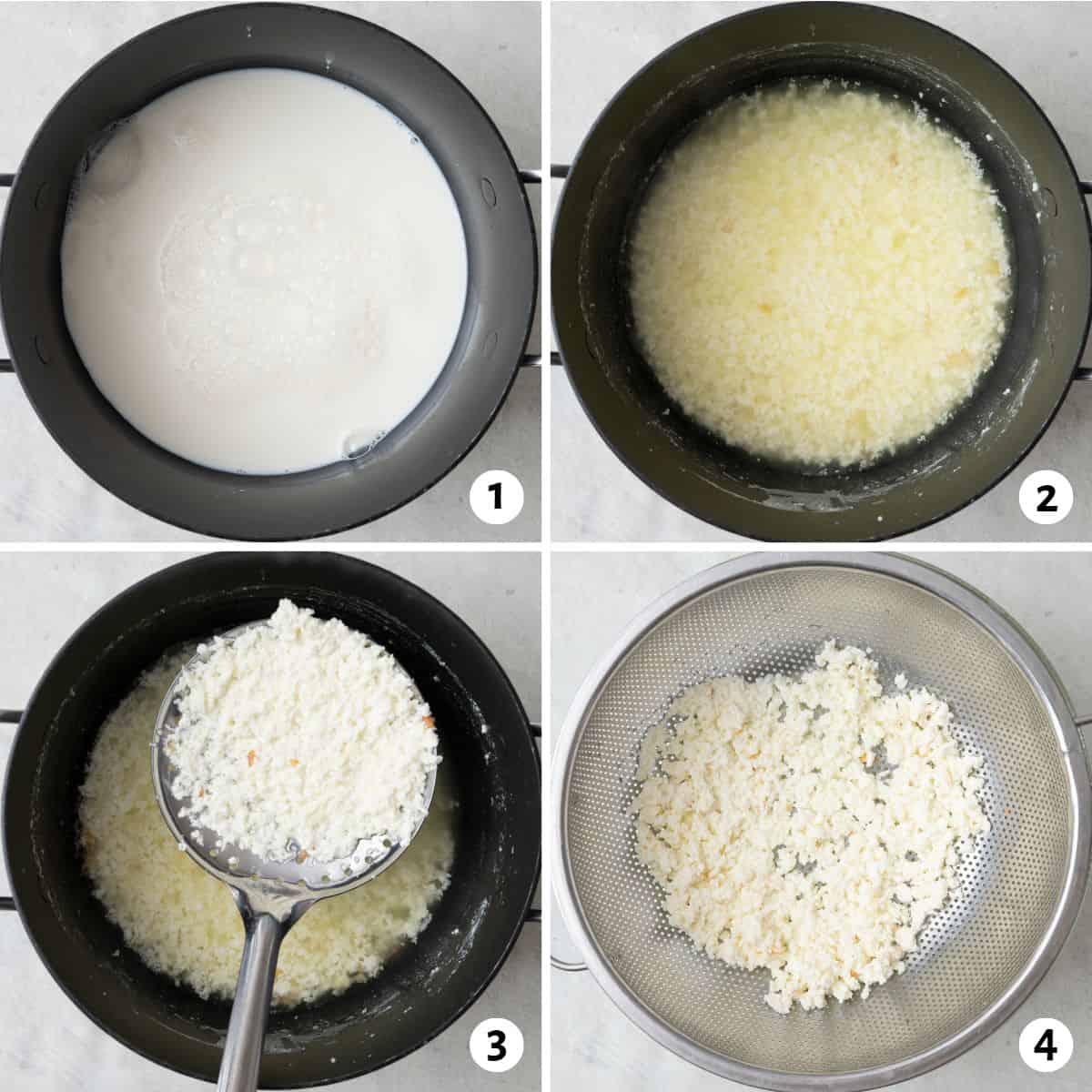
For the Ashta Cream
- Place the milk, flour, cornstarch, and sugar inside the same pot after cleaning it.
- Stir together without heat until well combined with no visible lumps. Heat the mixture and continue whisking until it boils and thickens like a custard.
- Stir in the orange blossom water.
- Allow the milk mixture to cool and thicken.
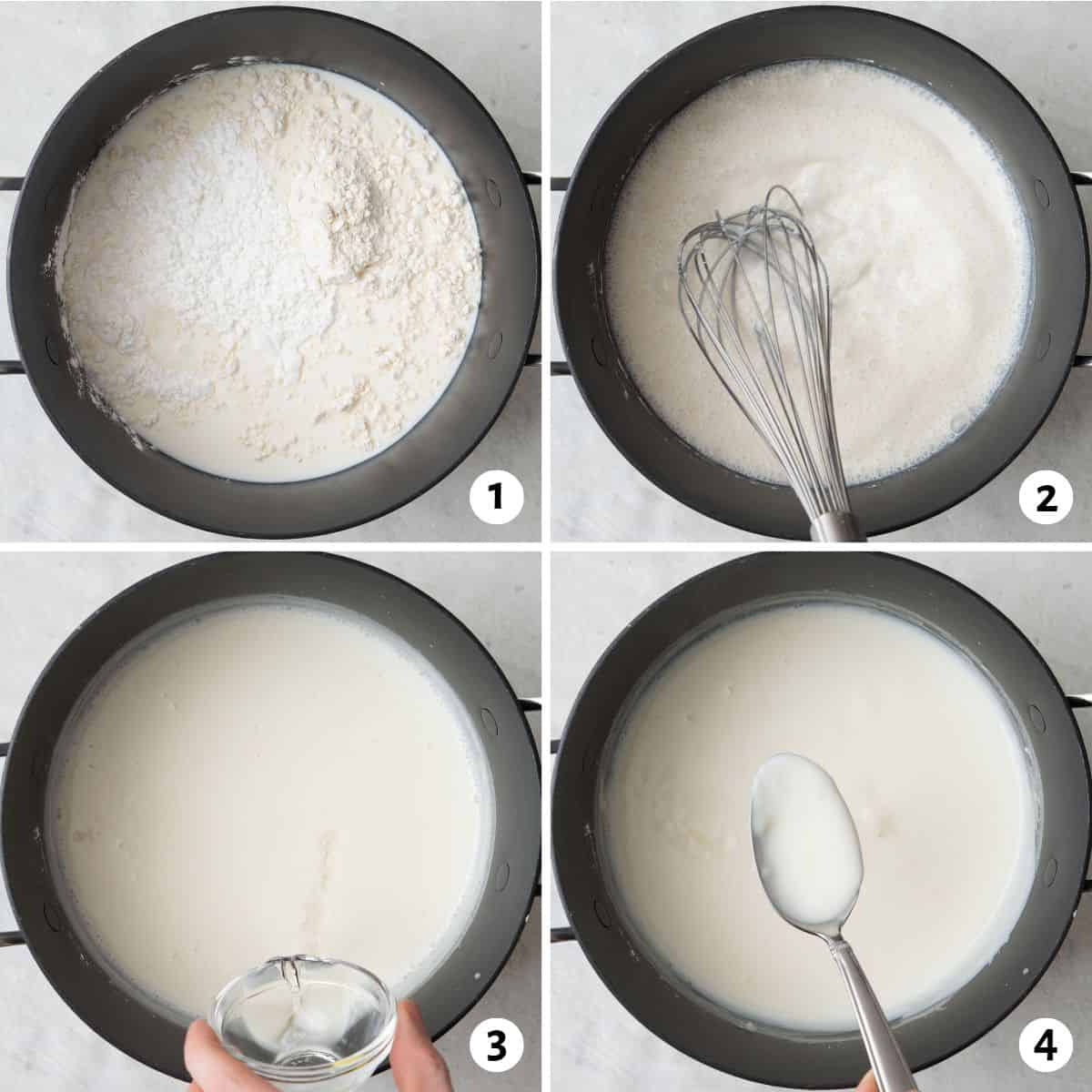
Adding Milk Curds and Ashta Cream
- Add the milk curds and Ashta cream to a high-speed blender.
- Blend until smooth and well combined.
- Transfer to a large shallow dish, then press a plastic wrap directly on the surface of the cream to prevent skin from forming.
- Refrigerate until cold, and the Ashta has thickened.
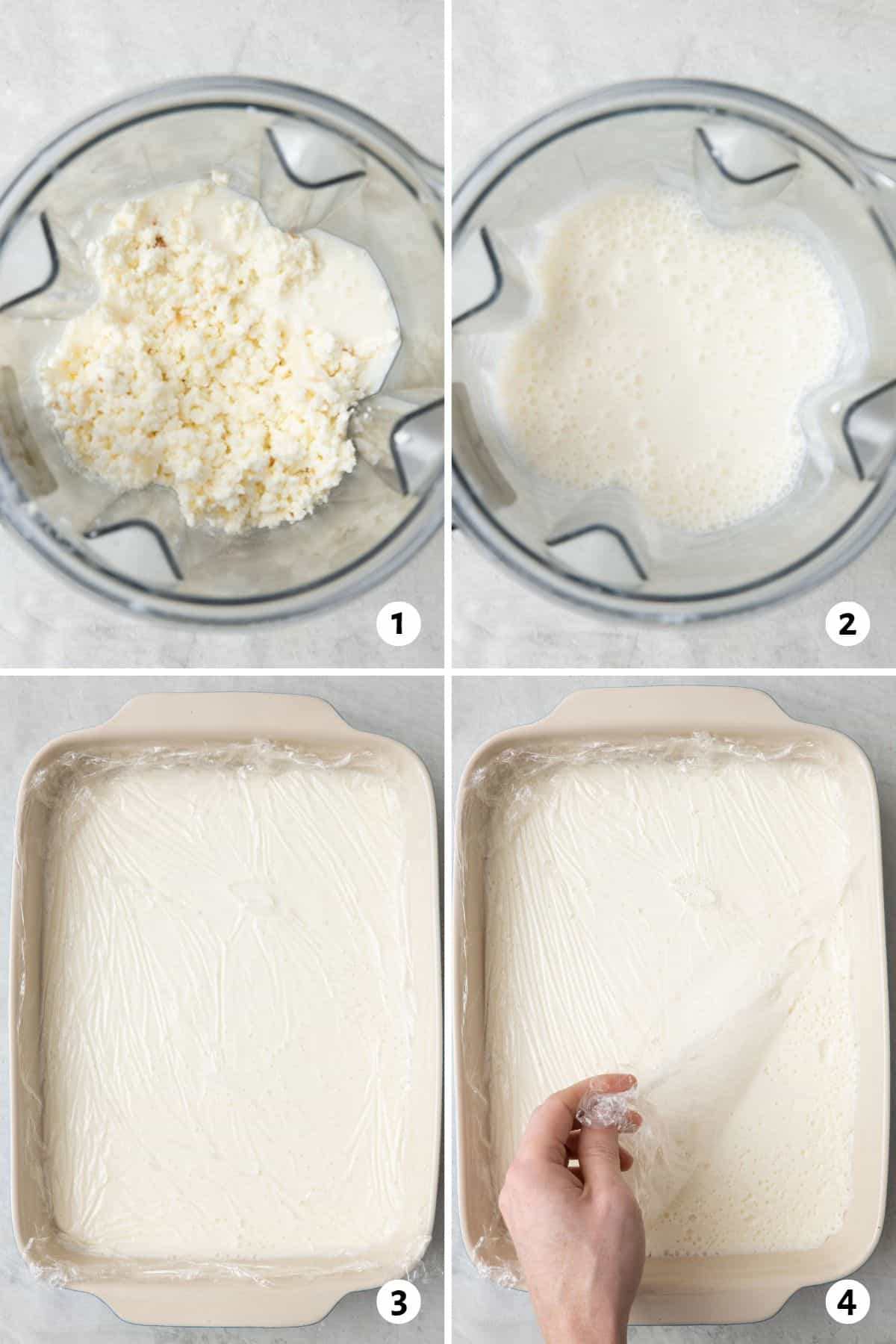
Tips for Making Ashta
- Substitute some of the milk for heavy cream. For a creamier consistency and extra flavor, use 1 cup of heavy cream to 3 cups of milk for the ashta cream.
- Whisk constantly. When adding the milk, cream, and flour to the pot, keep on whisking to get the smoothest, velvety consistency and prevent lumps of flour.
- Keep on scooping the clotted milk. Once you start seeing the clumps of cream, you can remove them from the pan. Keep movement in the liquid so it doesn’t scorch the curds, and continue until you are left with a small amount of yellow liquid.
- Use plastic wrap to cover the cream. Press the plastic directly onto the surface before refrigerating to prevent skin from forming on the top.
- Whip before serving. This isn’t necessary, but whisk the cream after setting if you want a more spreadable ashta to add to toast or smear on desserts. It will be smoother, much like a thin yogurt.
- Make it sweeter. Ashta isn’t a very sweet cream, so it pairs well with other sweeter recipes. You can add more sugar to the mix for a sweeter ashta, which is great for eating by itself, like a fruit parfait, or drizzle honey.
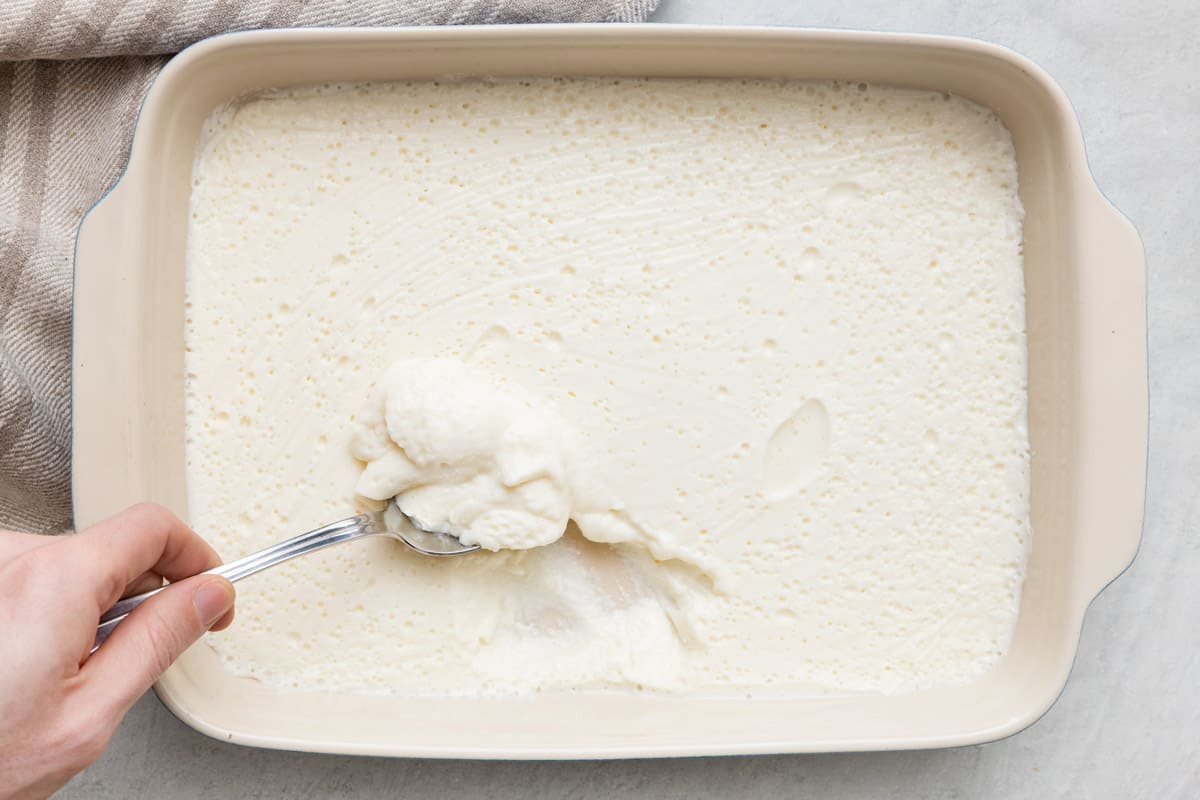
Popular Substitutions & Additions
- Use mascarpone instead of making the clotted cream. This is a shortcut method if you’d like to use to make the ashta using mascarpone. Use ½ cup.
- Use ricotta instead of making the clotted cream. This is another shortcut method you can try if you don’t want to make the clotted cream. Use ½ cup.
Recipes to Make with Homemade Ashta Cream
- Atayef
- Lebanese Style Fruit Cocktail
- Semolina Pudding
- Lebanese Rice Pudding
- Stuffed Dates
- Almond Cake
- Grilled Fruit Kabobs
- Watermelon Fruit Pizza
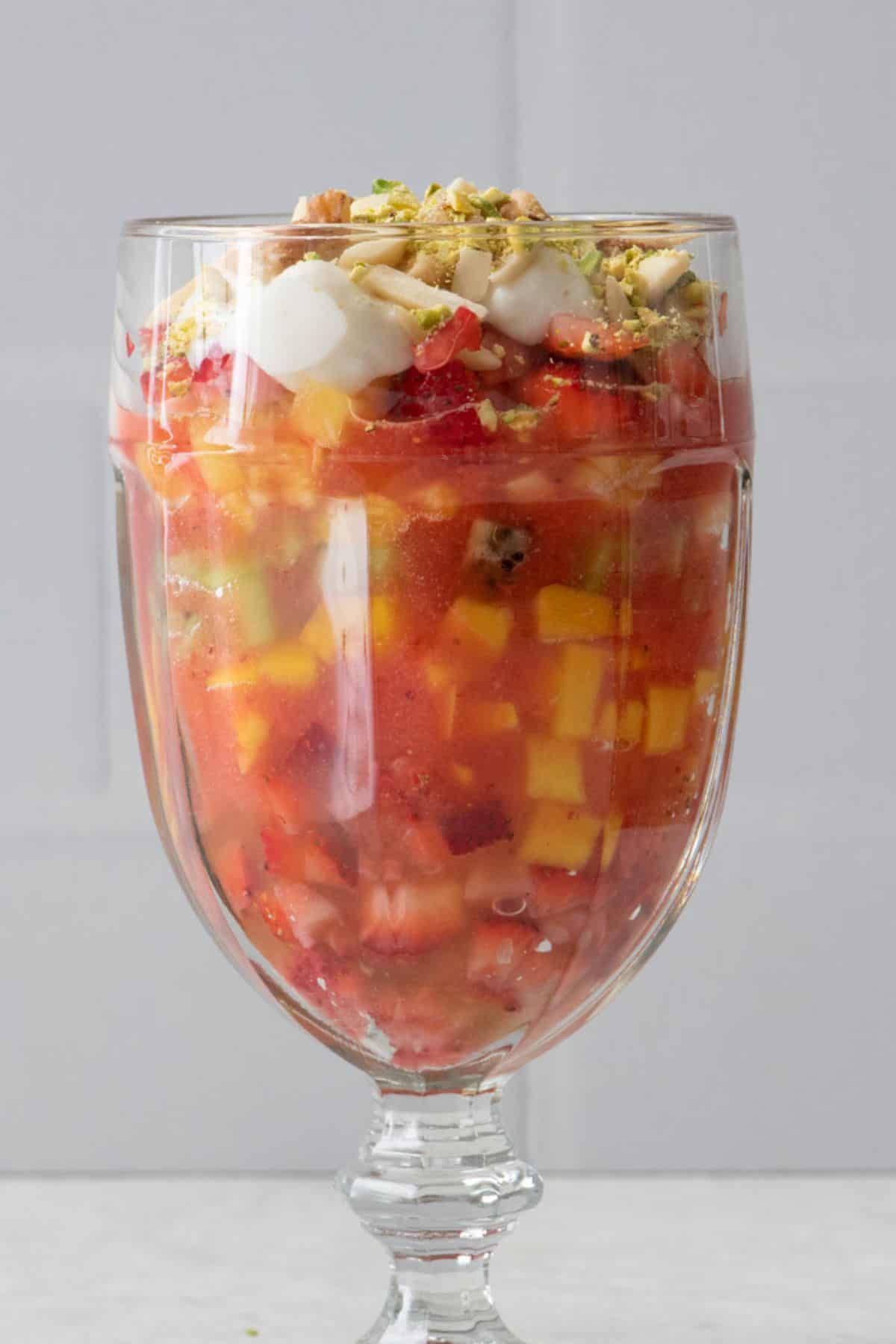
How to Store Ashta Cream
The key to storing ashta is preventing a film layer from forming on top. To do so, store it in an airtight container in the fridge and leave the plastic on the surface.
How Long Will Ashta Last in the Fridge?
Ashta will keep in the fridge for about 2 weeks when stored properly.
Can I Freeze Ashta?
No, it’s best not to freeze ashta. The milk will form ice crystals while freezing, affecting the creamy texture when thawed.
Frequently Asked Questions
Ashta and clotted cream are similar, but they have some differences. Ashta is made from simmered milk, while clotted cream is made from unpasteurized heating cream. Ashta also typically contains sugar and orange blossom water, while clotted cream is unsweetened.
Orange blossom water is a flavoring commonly used in Middle Eastern cuisine. It is made by distilling the flowers of the bitter orange tree and has a slightly sweet and floral taste.
Orange blossom water is a key ingredient in ashta and contributes to its unique flavor. However, if you cannot find orange blossom water or do not enjoy its taste, you can substitute it with other flavorings, such as rose water or vanilla extract.
Ashta is a versatile ingredient that can be used in various dishes. It is commonly used as a filling or topping for pastries, such as atayef or knafeh. It can also be served on its own with honey or fresh fruit.
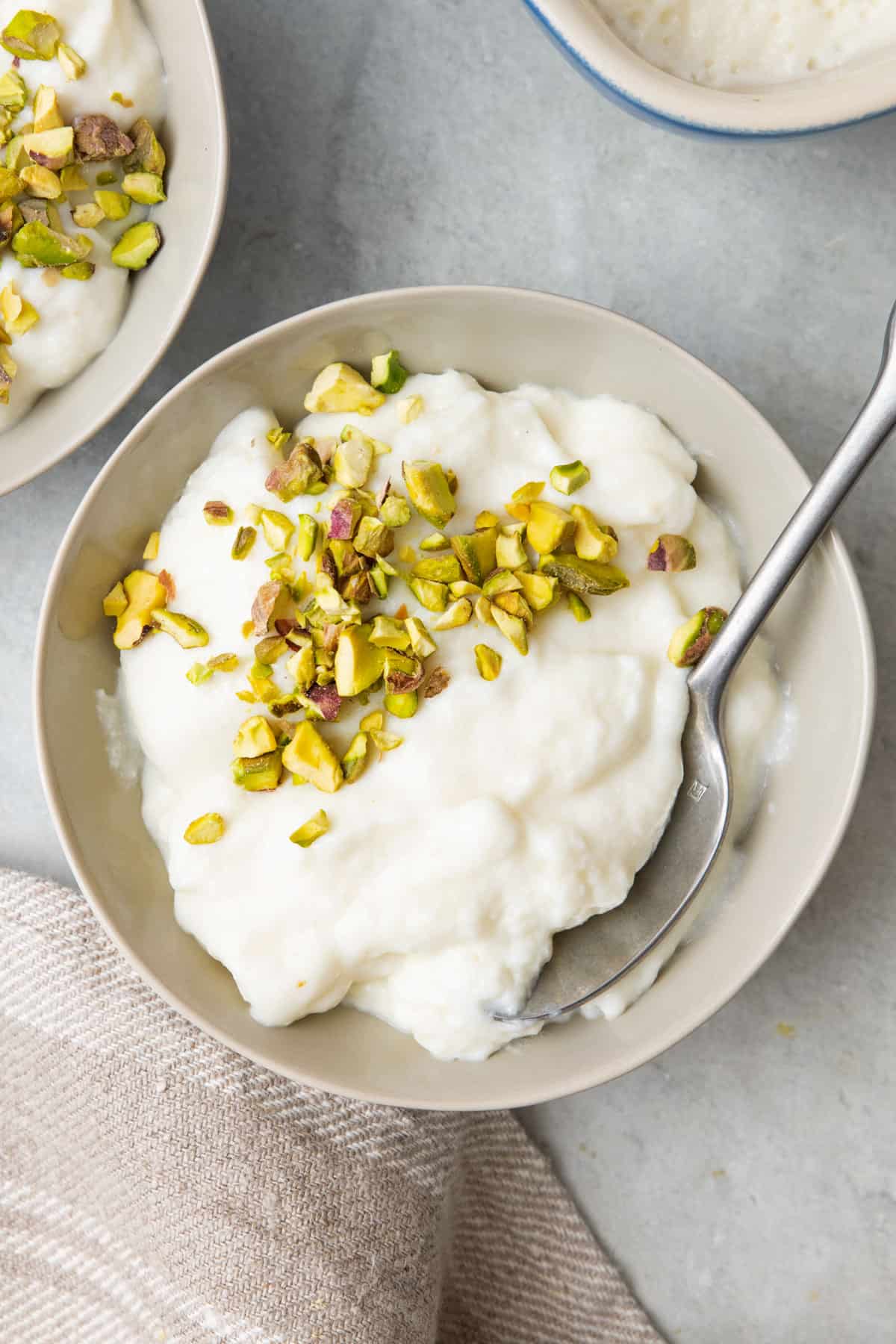
While this Middle Eastern dessert traditionally requires a lengthy cooking process to achieve its creamy texture, this recipe will show you how to make ashta while significantly reducing the hands-on time and still tasting just as good. Whether you want to add a delicious topping to your favorite dessert, spread it on toast for a sweet breakfast, or enjoy it with chopped nuts and honey as a tasty snack, ashta has got you covered.
More Cooking Tutorials:
- How to Make Icing
- How to Make Natural Dyes
- How to Make Whipped Cream
- How to Make Ganache
- How to Make Cashew Butter
- How to Make Granola
- How to Make Frosting
- How to Make Self Rising Flour
If you found this tutorial for How to Make Ashta helpful or if you try any recipe on Feel Good Foodie, then don’t forget to rate the recipe and leave a comment below! It helps others who are thinking of trying out this tutorial and we would love to hear about your experience. And if you snapped some shots, share it on Instagram so we can repost on Stories!

order MY book
The Feel Good Foodie Cookbook is now available everywhere books are sold!
Amazon TargetBarnes & Noble Books A Million Hudson Booksellers BookshopSCHULER Books

How to Make Ashta
Ingredients
For the milk curds
- 3 cups whole milk
- 3 tablespoons vinegar
For the ashta cream
- 4 cups whole milk
- ¼ cup all-purpose flour
- ¼ cup cornstarch
- 2 tablespoons granulated sugar
- 1 tablespoon orange blossom water
Instructions
Make the milk curds
- In a medium saucepan over high heat, bring the milk to a rolling boil and allow it to boil for 2 minutes.
- Add the vinegar and stir frequently until the mixture starts to boil, about 2 minutes. Remove from heat but keep stirring until the mixture separates.
- Set a large strainer over a bowl. Use a slotted spoon to remove the clotted cream from the surface of the saucepan and transfer it to the strainer set over the bowl to catch the whey. Continue the process until only a yellow liquid remains in the saucepan.
- Allow the clotted cream to come to room temperature while you prepare the ashta cream.
Make the ashta cream
- Rinse and wash the saucepan. Place the milk, flour, cornstarch and sugar inside and stir together without heat until well combined with no visible lumps.
- Turn on the heat to medium-high and cook, whisking constantly until the mixture boils and thickens like a custard, about 5 minutes. Stir in the orange blossom water and allow it to cool for 10 minutes.
Combine the milk curds and ashta
- Blend the milk curds with ashta cream in a high speed blender until smooth and well combined.
- Transfer to a large shallow dish, then press a plastic wrap directly on the surface of the cream to prevent a skin from forming. Refrigerate until cold, at least 1 hour, and serve as desired. Makes 4 cups.
Equipment
Notes
Nutrition
Nutrition information provided is an estimate. It will vary based on cooking method and specific ingredients used.






Would I be able to replace the curded milk for Mascarpone instead? And if so, how much should I add?
Yup! You can use mascarpone or ricotta instead of making the clotted cream. I recommend 1/2 cup.
Can the Orange Blossom be replaced with Orange Extract or any other ideas?
Hey Sonly! If you taste both orange extract and orange blossom water, you can definitely taste (and smell) the difference. Extract is made from the fruit, and blossom water from the flowers. If you don’t mind a slightly less floral and more citrusy taste, extract should work. Of course, use less than the recipe calls for as extract is stronger. Maybe add a bit at a time and adjust to your tastes?
Thanks B, I found 2 bottles of Orange Blossom in a Middle East store so it’s all good even though I haven’t tried the recipe yet. Have a blessed day ❤️
This ashta recipe is delicious! I used it for knefe and atayef and it worked great. Don’t worry about the vinegar–you don’t taste it at all. A double recipe fills up a 9 x 14 in. baking pan. I also used a handheld immersion blender to mix the curds with the custard since I don’t have a regular blender. The only problem is that the ashta is so good that you may eat it all while you are making it LOL! 😀 Thank you, Yumna! You are awesomeeee. <3
Aw, thank you, Sarah! You’re awesome!!!